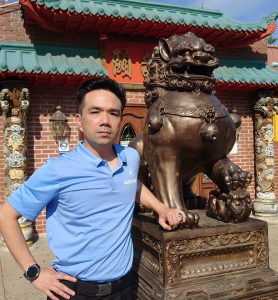
Marcus is an NC native from a military family and a two-time UNC alumnus that is now part of The Asian American Center staff. In addition, he previously worked for The College of Arts & Sciences as well as the Athletics Department so his experience and knowledge of campus can be a great resource for the student body.
He identifies strongly with those that feel labeled as “minorities”, “marginalized” or “other” in any aspect of their identity such as race, ethnicity, religion, gender, sexuality and/or veteran status. As part of the Carolina Collaborative for Resilience, Marcus hopes that he can be an aid to students that need to be heard.
When not in the office, he likes to focus on health and fitness and avoiding the outdoors.
He has completed the Carolina Firsts, Coach Approach, DEI in the Work Place, Embody Carolina, Green Zone, Mental Health 1st Aid, One Love, Safe Haven, Safe Zone & UndocuCarolina trainings.
Get to Know Marcus
How do you identify yourself?
Asian-American, Ally.
List three things that people would be most surprised to learn about you.
- Android & Wear OS user.
- Morning person.
- I still don’t know what I want to be when I grow up.
Whom do you most admire and why?
No one person in particular but I often admire fellow minorities that achieve great things and break down stereotypes and societal barriers.

